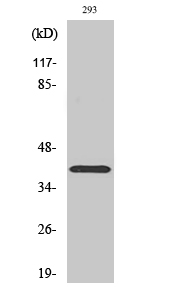CD298 Polyclonal Antibody
- Catalog No.:YT0745
- Applications:WB;ELISA
- Reactivity:Human;Rat;Mouse;
- Target:
- CD298
- Fields:
- >>cGMP-PKG signaling pathway;>>cAMP signaling pathway;>>Cardiac muscle contraction;>>Adrenergic signaling in cardiomyocytes;>>Insulin secretion;>>Thyroid hormone synthesis;>>Thyroid hormone signaling pathway;>>Aldosterone synthesis and secretion;>>Aldosterone-regulated sodium reabsorption;>>Endocrine and other factor-regulated calcium reabsorption;>>Proximal tubule bicarbonate reclamation;>>Salivary secretion;>>Gastric acid secretion;>>Pancreatic secretion;>>Carbohydrate digestion and absorption;>>Protein digestion and absorption;>>Bile secretion;>>Mineral absorption
- Gene Name:
- ATP1B3
- Protein Name:
- Sodium/potassium-transporting ATPase subunit beta-3
- Human Gene Id:
- 483
- Human Swiss Prot No:
- P54709
- Mouse Swiss Prot No:
- P97370
- Immunogen:
- Synthesized peptide derived from Human N-ternal CD298 . at AA range: 60-140
- Specificity:
- CD298 Polyclonal Antibody detects endogenous levels of CD298 protein.
- Formulation:
- Liquid in PBS containing 50% glycerol, 0.5% BSA and 0.02% sodium azide.
- Source:
- Polyclonal, Rabbit,IgG
- Dilution:
- WB 1:500 - 1:2000. ELISA: 1:10000. Not yet tested in other applications.
- Purification:
- The antibody was affinity-purified from rabbit antiserum by affinity-chromatography using epitope-specific immunogen.
- Concentration:
- 1 mg/ml
- Storage Stability:
- -15°C to -25°C/1 year(Do not lower than -25°C)
- Other Name:
- ATP1B3;Sodium/potassium-transporting ATPase subunit beta-3;Sodium/potassium-dependent ATPase subunit beta-3;ATPB-3;CD antigen CD298
- Observed Band(KD):
- 31kD
- Background:
- The protein encoded by this gene belongs to the family of Na+/K+ and H+/K+ ATPases beta chain proteins, and to the subfamily of Na+/K+ -ATPases. Na+/K+ -ATPase is an integral membrane protein responsible for establishing and maintaining the electrochemical gradients of Na and K ions across the plasma membrane. These gradients are essential for osmoregulation, for sodium-coupled transport of a variety of organic and inorganic molecules, and for electrical excitability of nerve and muscle. This enzyme is composed of two subunits, a large catalytic subunit (alpha) and a smaller glycoprotein subunit (beta). The beta subunit regulates, through assembly of alpha/beta heterodimers, the number of sodium pumps transported to the plasma membrane. The glycoprotein subunit of Na+/K+ -ATPase is encoded by multiple genes. This gene encodes a beta 3 subunit. This gene encodes a beta 3 subun
- Function:
- function:This is the non-catalytic component of the active enzyme, which catalyzes the hydrolysis of ATP coupled with the exchange of Na(+) and K(+) ions across the plasma membrane. The exact function of the beta-3 subunit is not known.,similarity:Belongs to the X(+)/potassium ATPases subunit beta family.,subcellular location:Identified by mass spectrometry in melanosome fractions from stage I to stage IV.,subunit:Composed of three subunits: alpha (catalytic), beta and gamma.,
- Subcellular Location:
- Apical cell membrane ; Single-pass type II membrane protein . Basolateral cell membrane ; Single-pass type II membrane protein . Melanosome . Identified by mass spectrometry in melanosome fractions from stage I to stage IV.
- Expression:
- Lung,Placenta,Uterus,
- June 19-2018
- WESTERN IMMUNOBLOTTING PROTOCOL
- June 19-2018
- IMMUNOHISTOCHEMISTRY-PARAFFIN PROTOCOL
- June 19-2018
- IMMUNOFLUORESCENCE PROTOCOL
- September 08-2020
- FLOW-CYTOMEYRT-PROTOCOL
- May 20-2022
- Cell-Based ELISA│解您多样本WB检测之困扰
- July 13-2018
- CELL-BASED-ELISA-PROTOCOL-FOR-ACETYL-PROTEIN
- July 13-2018
- CELL-BASED-ELISA-PROTOCOL-FOR-PHOSPHO-PROTEIN
- July 13-2018
- Antibody-FAQs
- Products Images

- Western Blot analysis of various cells using CD298 Polyclonal Antibody diluted at 1:1000



